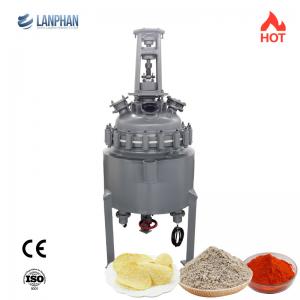

Add to Cart
Glass-lined Reactor Application
(1) Hydrofluoric acid and fluoride-containing ion medium.
(2) Phosphoric acid, the concentration is more than 30%, and the temperature is higher than 180°C.
(3) Sulfuric acid, concentration 10%~30%, temperature higher than 200°C.
(4) lye, pH≥12, temperature higher than 100°C.
When using an enamel reaction kettle, you should understand the medium in advance to ensure that it is used within its normal range of use.
Glass-lined reactors are currently widely used in petroleum,
chemical, rubber, pesticide, dye, pharmaceutical, food and other
industries to participate in vulcanization, nitration,
hydrogenation, alkylation, polymerization, condensation and other
processes.
Glass-lined reactors have good corrosion resistance, which are
widely used in chemical and other industries. Attention should also
be paid to its range of use to ensure better results.
Glass-lined Reactor Description
The glass-lined reactor is a container for physical or chemical
reaction, which is made of glass-lined enamel containing high
silica lining the inner surface of the steel reactor, and it is
firmly adhered to the metal surface after being burned at a high
temperature.
Glass-lined reactors are also known as: enamel reaction tanks,
glass-lined decomposition pots, glass-lined polymerization kettles,
etc.
Glass-lined Reactor Features
Glass-lined Reactor Parameters
| Model | K-50 | K-100 | K-200 | K-300 | K-500 | K-1000 |
| Capacity | 50L | 100L | 200L | 300L | 500L | 1000L |
| Pressure | -1~4Bar | |||||
| Operating Temperature | Rt~200℃ | |||||
| stirring Method | paddle-type | |||||
| Stirring Speed | 0-130rpm | |||||
| Stirring Power/KW | 1.1 | 1.5 | 2.2 | 2.2 | 3 | 4 |
| Heating Method | Electric Heating | |||||
| Heating Power/KW | 9 | 9 | 12 | 12 | 18 | 45 |
| Material | Q345R+High Performance Enamel | |||||
| Voltage | 220V/380V | |||||
